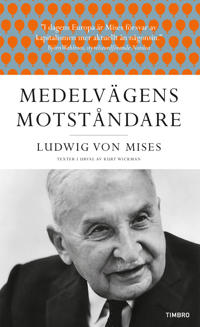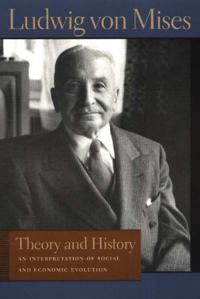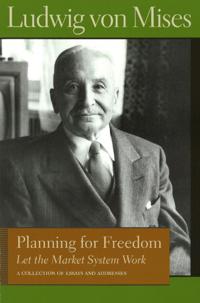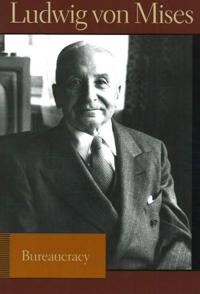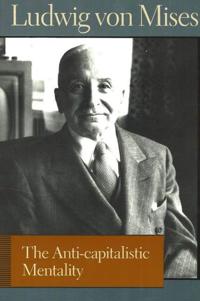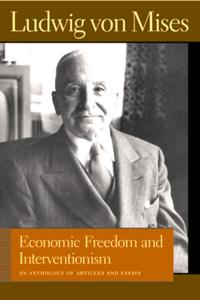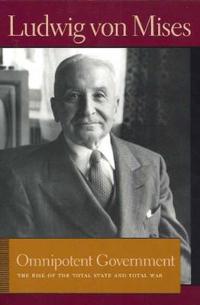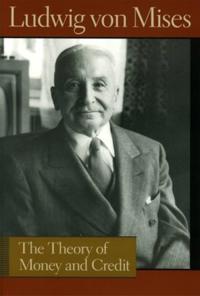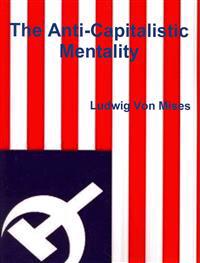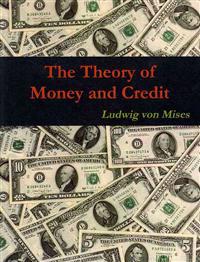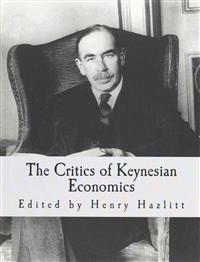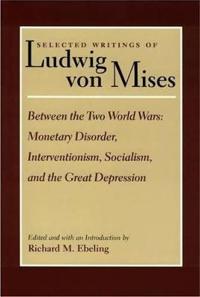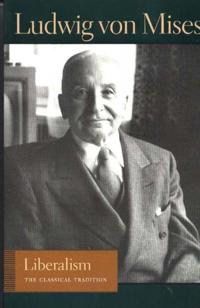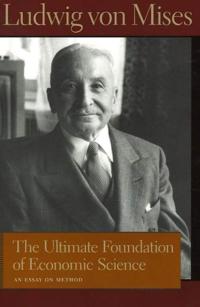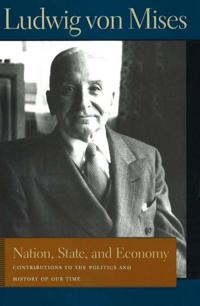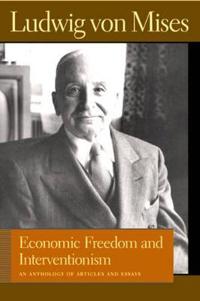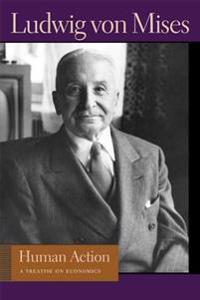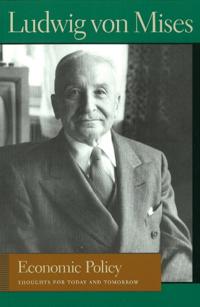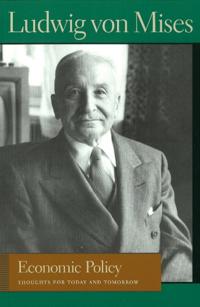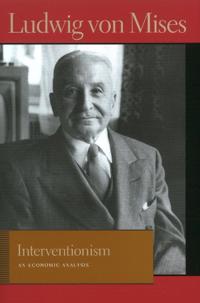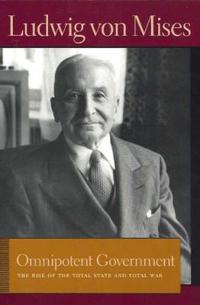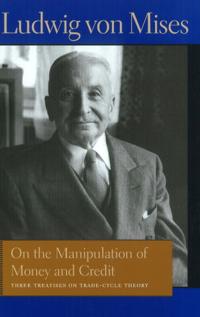Medelvägens motståndare : Ludwig von Mises texter i urval av Kurt Wickman (Pocket)
avLudwig von Mises
ISBN: 9789175668840 - UTGIVEN: 201211LUDWIG VON MISES (18811973) kallades en gång för liberalismens siste riddare. Från början verksam i Wien bröt han ny mark inom nationalekonomin som en av de främsta förgrundsfigurerna inom den österrikiska nationalekonomiska skolan. Nazisternas framfart fick honom att fly Europa för USA. Ä[...]
Theory And History (Pocket)
avLudwig Von Mises, Bettina Bien Greaves, Ludwig Von Mises
ISBN: 9780865975699 - UTGIVEN: 200508Ludwig von Mises was the leading exponent of the Austrian School of economics throughout most of the twentieth century. He has long been regarded as a most knowledgeable and respected economist, even though his teachings were generally outside the 'mainstream'. "Theory and History" is primarily a cr[...]
Human Action (Pocket)
avLudwig Von Mises, Bettina Bien Greaves, Ludwig Von Mises
ISBN: 9780865976313 - UTGIVEN: 2007034 books in slipcase. Mises attributes the tremendous technological progress and the consequent increase in wealth and general welfare in the last two centuries to the introduction of liberal government policies based on free-market economic teachings, creating an economic and political environment [...]
Planning for Freedom (Pocket)
avLudwig Von Mises, Bettina Bien Greaves, Ludwig Von Mises
ISBN: 9780865976610 - UTGIVEN: 200808In this anthology, Mises offers an articulate and accessible introduction to and critique of two topics he considers especially important: inflation and government interventionism. According to Mises, inflation, that is monetary expansion, is destructive; it destroys savings and investment, which ar[...]
Bureaucracy (Pocket)
avLudwig Von Mises, Bettina Bien Greaves, Ludwig Von Mises
ISBN: 9780865976641 - UTGIVEN: 200702Originally published by Yale University Press in 1944, "Bureaucracy" is a classic fundamental examination of the nature of bureaucracies and free markets in juxtaposition to various political systems. "Bureaucracy" contrasts the two forms of economic management - that of a free market economy and th[...]
The Anti-capitalistic Mentality (Pocket)
avLudwig Von Mises, Bettina Bien (EDT) Greaves, Ludwig Von Mises
ISBN: 9780865976719 - UTGIVEN: 2006-11In "The Anti-capitalistic Mentality", the respected economist Ludwig von Mises plainly explains the causes of the irrational fear and hatred many intellectuals and others feel for capitalism. In five concise chapters, he traces the causation of the misunderstandings and resultant fears that cause re[...]
Economic Freedom and Interventionism (Inbunden)
avLudwig Von Mises, Bettina Bien (EDT) Greaves, Ludwig Von Mises
ISBN: 9780865976726 - UTGIVEN: 2006-12This work serves as both a primer of the fundamental thought of Ludwig von Mises and an anthology of the writings of perhaps the best-known exponent of what is now known as the Austrian School of economics. This volume contains forty-seven articles edited by Mises scholar Bettina Bien Greaves. Among[...]
Omnipotent Government (Inbunden)
avLudwig Von Mises, Bettina Bien (EDT) Greaves, Ludwig Von Mises
ISBN: 9780865977532 - UTGIVEN: 2011-09Published in 1944, during World War II, "Omnipotent Government" was Mises' first book written and published after he arrived in the United States. In this volume Mises provides in economic terms an explanation of the international conflicts that caused both world wars. Although written more than hal[...]
Theory of Money and Credit (Pocket)
avLudwig Von Mises, Harold E. Batson, Ludwig Von Mises
ISBN: 9780913966716 - UTGIVEN: 198107In 1912, when Mises, at age thirty-one, wrote this landmark book, no monetary theory could be described as both securely founded on economic reality and properly incorporated into an analysis of the entire economic system. "The Theory of Money and Credit" opened new vistas. It integrated monetary th[...]
The Anti-Capitalistic Mentality (Häftad)
avLudwig Von Mises, Ludwig Von Mises
ISBN: 9781467934831 - UTGIVEN: 201111In "The Anti-capitalistic Mentality, " the respected economist Ludwig von Mises plainly explains the causes of the irrational fear and hatred many intellectuals and others feel for capitalism. In five concise chapters, he traces the causation of the misunderstandings and resultant fears that cause r[...]
The Theory of Money and Credit (Häftad)
avLudwig Von Mises, Ludwig Von Mises
ISBN: 9781467934879 - UTGIVEN: 201111Ludwig von Mises was the leading exponent of the Austrian School of economics throughout most of the twentieth century. He has long been regarded as a most knowledgeable and respected economist, even though his teachings were generally outside the mainstream. He wrote twenty-five books and hundreds [...]
The Critics of Keynesian Economics (Häftad)
avHenry Hazlitt, Ludwig Von Mises, Friedrich A. Von Hayek
ISBN: 9781493700486 - UTGIVEN: 2013-11Ludwig Von Mises
ISBN: 9780255366298 - UTGIVEN: 2010-04Ludwig von Mises was one of the greatest economists and political scientists of the twentieth century. He revolutionised the understanding of money, inflation and recessions; comprehensively refuted the arguments for socialism; and, provided a devastating critique of the methodologies of mainstream [...]
Selected Writings of Ludwig Von Mises
ISBN: 9780865973848 - UTGIVEN: 2002-12Ludwig von Mises, the author of such classics as 'Socialism and Human Action' is universally acknowledged as one of the most important classical liberals and economists of the twentieth century. In 1934, he left his native Austria in fear of the Nazis, who seized all his papers in 1938 in Vienna an[...]
Liberalism (Häftad)
avLudwig Von Mises
ISBN: 9780865975866 - UTGIVEN: 200510Presents the theoretical and practical arguments for liberalism. The term comes from the Latin word 'liber' (free). Mises defines liberalism as 'the liberal doctrine of the harmony of the rightly understood interests of all members of a free society founded on the principle of private ownership of t[...]
Human Action (Inbunden)
avLudwig Von Mises
ISBN: 9780865976306 - UTGIVEN: 2007044 books in slipcase. Mises attributes the tremendous technological progress and the consequent increase in wealth and general welfare in the last two centuries to the introduction of liberal government policies based on free-market economic teachings, creating an economic and political environment [...]
Ultimate Foundation of Economic Science (Häftad)
avLudwig Von Mises Works
ISBN: 9780865976399 - UTGIVEN: 200606Written toward the end of Mises's life, his last monograph, "The Ultimate Foundation of Economic Science", returned to science, economics as a science based on human action. Mises believed that, since the publication of "Human Action", economists and scientists alike had misinterpreted the idea of e[...]
Nation, State, and Economy (Inbunden)
avLudwig Von Mises
ISBN: 9780865976405 - UTGIVEN: 2006-09Published less than a year after Austrias defeat in World War I, "Nation, State, and Economy", examines and compares pre-war and post-war economic conditions and explicates Mises's theory that each countrys prosperity supports rather than undercuts the prosperity of other countries. Mises's humanita[...]
Economic Freedom and Interventionism (Häftad)
avLudwig Von Mises
ISBN: 9780865976733 - UTGIVEN: 200701This work serves as both a primer of the fundamental thought of Ludwig von Mises and an anthology of the writings of perhaps the best-known exponent of what is now known as the Austrian School of economics. This volume contains forty-seven articles edited by Mises scholar Bettina Bien Greaves. Among[...]
Human Action: A Treatise on Economics (Häftad)
avLudwig Von Mises
ISBN: 9780865976795 - UTGIVEN: 2006-03Economic Policy (Inbunden)
avLudwig Von Mises
ISBN: 9780865977358 - UTGIVEN: 201005"Economic Policy"contains six lectures Ludwig von Mises delivered in 1959 at the Centro de Estudios Sobre la Libertad in Argentina. The lectures were posthumously transcribed by Mises's wife, Margit, and edited by George Koether, a student and long-time friend of Mises. This volume serves as an exce[...]
Economic Policy (Häftad)
avLudwig Von Mises
ISBN: 9780865977365 - UTGIVEN: 201005"Economic Policy" contains six lectures Ludwig von Mises delivered in 1959 at the Centro de Estudios Sobre la Libertad in Argentina. The lectures were posthumously transcribed by Mises's wife, Margit, and edited by George Koether, a student and long-time friend of Mises. This volume serves as an exc[...]
Interventionism (Häftad)
avLudwig Von Mises
ISBN: 9780865977396 - UTGIVEN: 201101"Interventionism" provides Mises' analysis of the problems of government interference in business from the Austrian-school perspective. Written in 1940, before the United States was officially involved in World War II, this book offers a rare insight into the war economies of Hitler's Germany and Mu[...]
Omnipotent Government (Pocket)
avLudwig Von Mises
ISBN: 9780865977549 - UTGIVEN: 201104Published in 1944, during World War II, "Omnipotent Government" was Mises' first book written and published after he arrived in the United States. In this volume, Mises provides in economic terms an explanation of the international conflicts that caused both world wars. Although written more than ha[...]
On the Manipulation of Money and Credit (Pocket)
avLudwig Von Mises, Bettina Bien Greaves, , ,
ISBN: 9780865977624 - UTGIVEN: 201108Published by Liberty Fund for the first time in English, "On the Manipulation of Money and Credit" consists primarily of three pieces on monetary theory written by Ludwig von Mises between 1923 and 1931. As a precursor to Human Action, Mises' magnum opus, this volume includes some of his most import[...]

